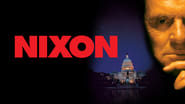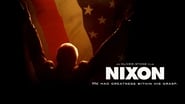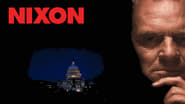chaswe-28402
Oliver Stone presents Nixon in a positive, sympathetic light. Nixon is seen as the conditioned victim of his family circumstances and rigorous upbringing. Behind all his actions as a grown man, you are encouraged to see a hurt and bewildered small boy. In spite of this, he personifies dogged determination.Oliver Stone's judgement was seriously inspired when he cast Nixon. If I thought long and hard, I could probably not come up with a better choice than Anthony Hopkins, one of the greatest actors of this age. Richard Nixon and Anthony Hopkins share an approximate similarity of appearance, but where Hopkins scores is in his mastery of articulation and verbal timing. Not long into the movie Hopkins acquires the persona of Nixon, without specifically imitating him.Anthony Hopkins was so good, I watched the film several times. I believe Stone rejected a motley group of several other contenders for the role, before wisely settling on Hopkins as his ideal. He must have been exceptionally pleased with the result.Stone includes memories from Nixon's childhood up through and past the Watergate scandal. Clearly, numerous film actors wanted to be in this movie, for obvious reasons. It's an outstanding production, and anyone who watches it will be given an unusually fine history lesson. It stays in the mind. I strongly recommend it: give it a close watch ! It's a bit long, so I dock one star.
kernwilson
This is another movie I could not finish. And I am one of those guys who stays to the bitter end of every movie. I see it as almost a badge of honor. But there are 4 movies I have failed in the last two years, and this is one of them.I don't think Nixon was an especially bad movie. I just could not get into it. There was a lot of dialogue, but I could never figure out who was doing the talking and what their significance to the story was. That was the first problem. Huge cast of characters, but I was not familiar enough with the events with which they were associated or with who they were supposed to be to be able to follow along. In addition, the movie had a few flash-backs and fast-forwards, which didn't help in sorting things out.The second problem was that Anthony Hopkins just didn't look like Richard Nixon. He did his typical fine performance, but in this movie, acting was not enough. Richard Nixon's appearance is so distinctive that there is no way you can sort of look like him. You either do, or you don't. Nixon's sharp features preclude him from being well-represented by only a close resemblance. All they gave Hopkins was Nixon's type II pattern baldness hairline. I watched scene after scene with seemingly random people who I couldn't keep straight and this old sad-sack that was always right in the middle of them. I had to keep reminding myself that the sad sack was supposed to be Richard Nixon.As stated earlier, I don't think this was an especially bad movie. For me, it just did not flow well. I had to help it along, and with its confusing cast of characters that became too great a struggle. I'm not sure when I turned it off, but I think it was after over 2 hours of watching. I'm sure I was near the end and I probably could have finished it, but I was so confused by that time that I didn't see the point.After thinking back, the movie plays more like a documentary than a vehicle for entertainment. It is heavy on facts and history and might be more suited to students of political history. It is a thinking person's movie. Maybe that was my problem. I was just looking for something to relax to before I went to bed. You have to be prepared to work to get through this one. A suggestion might be for you to Google Nixon before watching it to get some background refreshers. Or maybe you just need to be older than I am. I think if you were a politically-aware adult in the early 70s you'd probably have enough knowledge to be able to follow this film. But I was only in second grade when I learned that President Nixon was going to have peaches.
denis888
I still am perplexed by this roller-coaster of a movie - three hours of very weird montage, sudden jumps, crazy color schemes, abrupt flashbacks and very heavy moments made me quite amazed. I am not an Olver Stone fan and I am more on Steven Spielberg's side, but then, I really wanted to see a Nixon movie. Richard M. Nixon was and still sadly is a traduced, maligned and ill-depicted man but he was a real man, driven and deep, full of demons (who isn't?) and really decent in many (but not all) ways. Anthony Hopkins did a great job here, maybe, too far sometimes. I saw many footages with real Nixon and he was not that caricature as Hopkins depicted him. And come on, was he really that much into drinking? The sources are highly controversial in there. Anyway, that was very compelling and mind-provoking to see that monster of a film and realize how multi-faceted and difficult Nixon was, and all who were near him. The brilliant cast of drama heavies (Woods, Sorvino, Allen, Hoskins, Harris) did a decent job, true. But one serious claim remains - the life of this great man was so large and busy that even 3 hours were not enough. Must have been a serial or several films. There are some more complaints about the movie - no Chuck Colson, no deeper plot with Ed Harris, not enough on McCarthy - but still, the film is not bad. Albeit, too harsh on a real great man
chaos-rampant
I want to preface this by saying I'm not lambasting the film for any grievance with the portrayal one way or the other. It is an ordinary portrait of Nixon all told, as has been rehabilitated into public consciousness: a broken man who could achieve anything except the one thing he wanted to, to be loved and whole. His plight is ordinary in the sense that it is deeply human, this is how we have retrogradely dramatized Nixon in order to be able to understand his actions. His downfall, also human: the desire to cling to the controls of a life that is far beyond our scope or any four-year presidential term. The machinery or system keeps grinding out a narrative and we have only a small window to effect any change at all.So we unravel from Watergate, where all control was lost from too much desire for it. We piece Nixon's image in a reverse Kane style; from inside, together with this man looking for himself.If I am lambasting the film, it's for how much it grew out of hand as a film. It is very much Stone doing Nixon; feverish ramblings from personal darkness, powerful but manipulative rhetorics. Shamelessly emotional when it serves a purpose. We're spared nothing in the cinematic onslaught of different footage, dutch angles, slow-motion, light flares, incessant cuts and counter-cuts. No symbolism is too hamfisted: blood oozing from a steak as use of nuclear weapons is contemplated, superimpositions of Nixon's face on Mao's as the analogy is being forced, a gigantic Nixon looking pensive superimposed on the skies the day before Dallas. I believe Stone took on Natural Born Killers solely as a test run for the madness of this. Of course that film was a deliberate mess, pitched as hysterical satire. This is hysterically assembled, helter skelter.On the part of Stone, my view is that control was lost from the desire to be America's objective chronicler. In the early stages I believe the film was intended to be one long reverie and internal monologue triggered by the Watergate tapes. No doubt Stone was familiar with Robert Altman's film on Nixon and understood the project to be fundamentally visual. The idea was that we would visit, from this room where an old weary man is listening to his own voice, different stops in a long life in and out of the public eye, looking from both ends, looking for a narrative and who controlled the telling. In lieu with JFK, I believe part of the film was meant to be an unreliable, paranoid testimony shaped from memory. In lieu with JFK where the film was the trial that never happened, this would be the televised public apology that did. A confessional but one we could trust?But it grew out of hand, as did the man's ambitions.






